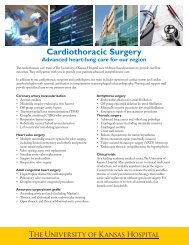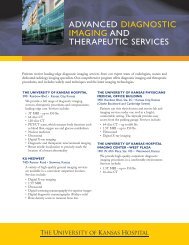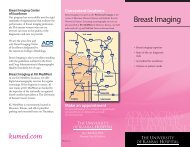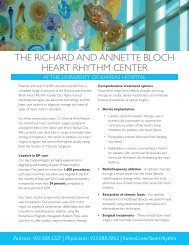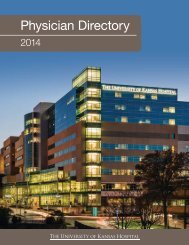The Changing Face of Interventional Medicine - The University Of ...
The Changing Face of Interventional Medicine - The University Of ...
The Changing Face of Interventional Medicine - The University Of ...
Create successful ePaper yourself
Turn your PDF publications into a flip-book with our unique Google optimized e-Paper software.
Medical Advancements at<strong>The</strong> <strong>University</strong> <strong>of</strong> Kansas HospitalEffects <strong>of</strong> <strong>Interventional</strong> <strong>Medicine</strong>in NephrologyAlan Yu, MDDirector, Kidney InstituteMore than 871,000 people in theUnited States are being treated forend-stage renal disease, accordingto the National Institute <strong>of</strong>Diabetes and Digestive and KidneyDiseases. <strong>Of</strong> those patients, more than365,000 receive renal replacement throughhemodialysis.For these patients, vascular access isboth a lifeline and an Achilles heel.While arteriovenous fistulas andgrafts are vital for dialysis, they aresusceptible to stenosis, thrombosis andinfection. When these complicationsoccur, prompt treatment is critical to apatient’s survival.Hospital admissions for vascular accessinfection rose steadily nationwide until2005. Since that peak, admissions havefallen 24 percent. A portion <strong>of</strong> thisdecline may be attributed to the rise <strong>of</strong>interventional medicine in nephrology.<strong>Interventional</strong> procedures<strong>Interventional</strong> procedures can quicklyclear arteriovenous fistulas forhemodialysis without open surgery andprovide better patient outcomes. Suchprocedures include catheter placement,fistulograms, percutaneous balloonangioplasties, thrombectomies, venousmapping and kidney biopsies.At <strong>The</strong> <strong>University</strong> <strong>of</strong> Kansas Hospital,our nephrologists work alongsideinterventional radiologists, providingthem with key knowledge about dialysis,the potential complications <strong>of</strong> vascularaccess, and the effects <strong>of</strong> complicationson patients’ treatments and quality<strong>of</strong> life. Using minimally invasiveprocedures and this multidisciplinaryapproach, we can quickly treat clots orfailures <strong>of</strong> arteriovenous fistulas andgrafts, renal artery stenosis, and many,ifif not all, vascular access complications.Improved care leads to loweroverall costsFor patients, the power <strong>of</strong> interventionalnephrology is realized in the reduction<strong>of</strong> emergency treatments andhospitalizations. Studies have showninterventional nephrology programsdecrease the number <strong>of</strong> hospitalizationsand missed dialysis treatments.However, beyond interventionalnephrology’s positive effect on patientcare, there is an undeniable financialimpact.In 2010, Medicare expendituressurpassed $30 billion with totalend-stage renal disease, or ESRD,expenditures amounting to $47.5billion. A significant proportion <strong>of</strong>these costs were due to complications <strong>of</strong>vascular access, emergency dialysis andhospitalizations <strong>of</strong> patients with ESRD.World-class kidney careFor the past four years, <strong>The</strong> <strong>University</strong><strong>of</strong> Kansas Hospital’s nephrologyprogram has ranked among the nation’sbest in U.S. News & World Report’s BestHospitals. Nephrology ranked No. 15among the nation’s top 50 for 2012-13. We <strong>of</strong>fer superb clinical fellowshiptraining, a widely respected clinicalprogram and a strong tradition intranslational medicine that integratesscientific research with clinical trials.To consult with one <strong>of</strong> ournephrologists, call 913-588-5862or toll free 877-588-5862. Findmore information at kumed.com.Dr. Yu is director <strong>of</strong> the division <strong>of</strong> nephrology and hypertension, and pr<strong>of</strong>essor <strong>of</strong> medicine at the <strong>University</strong> <strong>of</strong> Kansas School <strong>of</strong><strong>Medicine</strong>. He is also director <strong>of</strong> the Kidney Institute at the <strong>University</strong> <strong>of</strong> Kansas Medical Center. Dr. Yu is also co-editor <strong>of</strong>Brenner and Rector’s <strong>The</strong> Kidney, the internationally best-selling nephrology reference text.11KUMedInnovationsSummer2013_X.indd 116/13/13 10:09 AM





